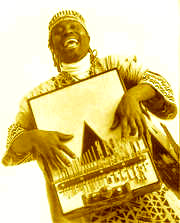
for information / pour des renseignments

![]()
![]()
by Geoffrey Hays
"I am very lucky in life," says Cameroon-born musician Njacko Backo.
Backo is a multi-talented musician and a natural mystic, with a deep spiritual sense and a refreshing, no B.S. approach to life. He recently released his third CD, Lode Yeuk, at the Bamboo, with the Toronto incarnation of his band, Kalimba Kalimba. Still a newcomer to the local music scene, Backo has a wealth of international musical experience, and more than a touch of grassroots wisdom.
'Music can cure people. It's universal, it's spiritual.'
He grew up in an African village surrounded by music, with a mother who always sang and danced, and a grandmother who, to her dying days, played the didjeridoo for the local kids.
A world traveller from his teen years on the African continent, Backo spent four years in Amsterdam and nine in Montreal before moving to Toronto last year. Along the way, he studied with many West African masters and played with some of the finest musicians his adopted countries have had to offer. And though the frozen tundra of a Toronto February might accentuate the miles travelled from his African home, the journey for him has always been about the music and community.
"People ask me if I miss Cameroon," he says. "I say no -- which surprises them. But why do I have to miss Cameroon? If I have money, I take a plane and go. If I want to see my family, I go see them. I never really think about living somewhere out of Africa. The way I see life may be a bit different than other people. But I care more about people than I care about the [geographic] line where I live."
Not that Africa isn't with him everyday. His sense of the magic of life, and of what is right and true, are deeply influenced by his African roots. Musically and spiritually, he still draws on the lessons he learned there from his family, mentors and village life. But Backo is also a realist, and his understanding of the student's role has kept him mobile.
"The key of learning is not to do things like your teacher," says Backo. "You learn, then you develop your own thing. I've learned so many things from so many people, and this, for me, is like transitions in life through the spirit of music. I'll learn from them, but I don't just stick -- it's like a key to another door."
By three or four years of age, Backo and the village children were off by themselves in the bush, creating choreography and songs, which they would perform during holidays for mangos and bananas. Sundays in his house were community meetings, followed by hours of dancing and song. Two doors away were the master players of the kalimba, a small thumb piano, whose songs carried the ancient stories and wisdom of local life through the ages, "to make the love of the village stay" says Backo. In some ways, music was life and religion. But it was also a lot of fun.
"In my village, all the kids were managers of Toys R Us. You don't have sound systems, you don't have TV, nothing. So if you want to have fun you make instruments and play music." Which they did, out of tin cans or anything they could find. For Backo, making your own instruments is part of the spirituality of music. And during his many years of presentations and workshops in Quebec schools, he taught this to kids, hoping to instill in them a sense of the power of music.
"Music can cure people. It's universal, it's spiritual. Music is not just because people play. Someone writes a tune, and in one week 20 million may hear it. There's magic there. We as human beings cannot even describe it. It's so strong that it's impossible to define what music is. You can't know. Only God knows."
For someone who sees music as his life, that magic comes with responsibilities. Backo knows that his style has evolved from its village roots, but, like other African musicians, he still feels like a "cultural ambassador" of his country's music. Nevertheless, what Backo seems to bring is not nationalism or even the flag of a race or a culture, but a unique and positive way of looking at the world and at music.
"I don't like too much the idea of thinking African, or thinking white or Chinese. I don't deal with those ideas. I deal with the fact that I'm a person. I praise God. I pray everyday. Because I understand [that] he made me special. Like he makes a Canadian special. Practice my instruments, take care of my family and my business -- that's the main thing. I don't want to confuse myself. We have to be proud to be people. We have to show after our time on earth that we leave a memory behind us. If you think like that, you don't have too much time to think about too many things."
And the way to the heart of the beat? "Play and play and play and play, until you get inside the music. The main thing is to get the people free within the music."
Designed and produced by Karen Ahmed. Published February 25, 1999 www.toronto.com
for information / pour des renseignments